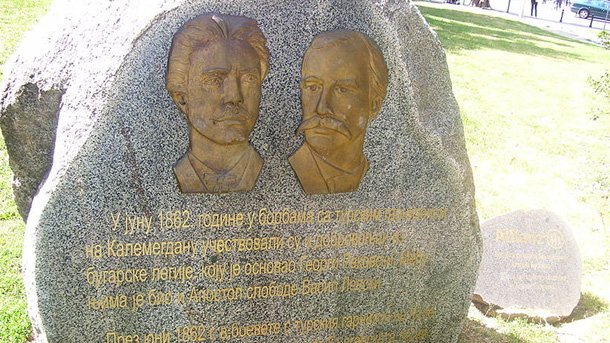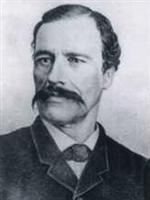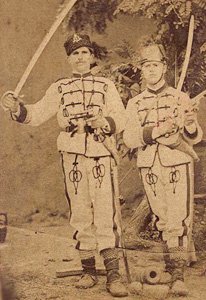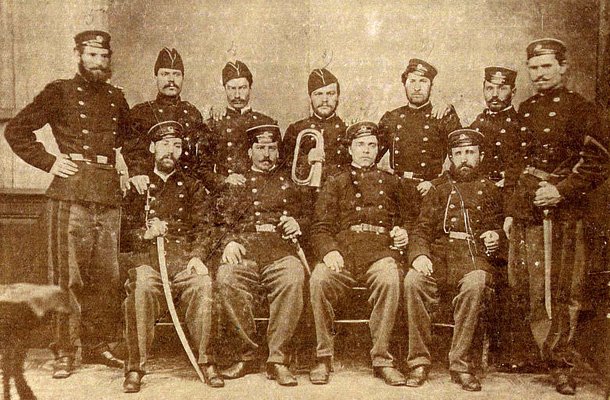
150 years ago, on June 3rd the volunteers from the First Bulgarian Legion had their first taste of gunpowder by entering into a battle with the Turkish garrison in the Serbian capital Belgrade. The formation of the Bulgarian armed contingent on Serbian land is associated with the new situation on the Balkan Peninsula between 1859 and 1860. Then, the relations between Belgrade and Istanbul became quite tense. The government organized a massive anti-Turkish propaganda in the Serbian capital and began to prepare for a military campaign against the Ottoman Empire.

The complicated international situation at the Balkans was wisely assessed by the great Bulgarian revolutionary Georgi Rakovsky, who arrived in Belgrade in 1860 to accomplish his ideas and free Bulgaria from the Ottoman Yoke. In the Serbian capital he began to publish “Dunavski Lebed/ Danube Swan”- the first revolutionary newspaper of Bulgarian emigrants. In Belgrade Rakovski developed a plan that aimed at liberating Bulgarian people from the yoke. According to this plan the future rebellion in Bulgaria should be made together with a military campaign of the Serbian army against the Ottoman Empire. The Bulgarian patriot planned to create in Serbia a military squad of 1000 soldiers, who had to make their way into Bulgarian territory after the beginning of the war between Serbia and the Turkish Empire. They had to cross the ridge of Stara Planina Mountain and reach the Bulgarian capital Veliko Tarnovo where, with the help of the previously created local committee, they had to liberate the city and pronounce freedom of Bulgaria.  In 1862 Rakovski came up with a statute of the Interim Government, which according to his plans had to head the whole military campaign. He started negotiations with the Serbian officials and got a permission to organize a voluntary squad, which had to be formed of fellow citizens. He used the pages of Dunavski lebed newspaper to call upon all who love Bulgaria. Thus, in the spring of 1862 he summoned around 600 people in the Serbian capital who entered the First Bulgarian Legion. Among them were names as Vassil Levski, Stefan Karadza, Ilio Voivoda, Christo Tsonev, Vssil Drumev, Hristo Ivanov, Hristo Makedonski, Dimitar Berovski and others.
In 1862 Rakovski came up with a statute of the Interim Government, which according to his plans had to head the whole military campaign. He started negotiations with the Serbian officials and got a permission to organize a voluntary squad, which had to be formed of fellow citizens. He used the pages of Dunavski lebed newspaper to call upon all who love Bulgaria. Thus, in the spring of 1862 he summoned around 600 people in the Serbian capital who entered the First Bulgarian Legion. Among them were names as Vassil Levski, Stefan Karadza, Ilio Voivoda, Christo Tsonev, Vssil Drumev, Hristo Ivanov, Hristo Makedonski, Dimitar Berovski and others.
In June 1862 the tension in Belgrade between Serbs and the Turks escalated. On June 3rd a Serbian soldier was killed by Turkish warriors near a city fountain. This murder was used by the local Serbs as a reason to start chasing all Turkish soldiers who were at that time outside their garrison, which was situated in the Belgrade fortress.
When the battle began Rakovski was in the middle of his attempts to organize a rebellion that had to free Bulgaria. However, together with the Bulgarian volunteers, he joined the battle to help the Serbs. In the beginning the Serbian authorities tried to stop the conflict and Rakovski received an order to retreat, but the battles lasted through the whole night. Most dramatic of all were the ones near Varosh Gate and Vidin Gate. Bulgarian soldiers took part in those battles, showing huge bravery. Georgi Rakovski and Ilio Voivoda locked themselves in a Serbian house near Varosh Gate and began shooting at the retreating Turks. Another Bulgarian group, with the help of Serbian soldiers chased off the enemy near Kale Megdan. Bulgarian constructions workers, armed with axes and mattocks began to destroy every Turkish guard.
Owing to the efforts of the Serbian government and the foreign diplomats, the fights were ceased on June 16th. In the same day soldiers from the Bulgarian legion brought all the weapons taken from the enemy to Rakovski. They girded one of the trophy swords on his waist. He hailed them with “Hello lads” and the reply was” Hurray, Hurray, long live Bulgaria and its brave soldiers!” In the early morning of June 17th the situation was peaceful until the Turkish artillery from the Belgrade fortress began to shoot at the city. The shootings lasted four hours and a half and incurred complicated diplomatic crisis. A number of battles started again in Belgrade. Bulgarian volunteers also joined those battles. According to memories of witnesses Rakovski was the one leading the Bulgarian troops. They crossed nearby the Prussian council in Belgrade, where they were greeted by the Prussian general council and later by Serbian soldiers with the hail “Long-live Bulgaria and the Bulgarian legion!” However there was no war between Serbia and the Ottoman Empire and later, at the insistence of the government in Belgrade, the legion was disbanded. 
Members of the Second Bulgarian Legion. The second sitting from the left is Vassil Levski
In 1867, when the relations between Serbia and The Ottoman Empire worsened again and the Serbian government began to prepare for another battle, the Second Bulgarian Legion was formed. The formation of both legions shows the writers of the Bulgarian national revival that the creation of a centre for control of the national liberation movement in other countries and binding the goals of our national revolution with foreign policies was a risky job. Despite that, the legions give a first taste of gunpowder to many future leaders of our movement for liberating the country.
English version: Kostadin Atanassov
There are three special days on the calendar of the Bulgarian Orthodox church, on which believers pray to God and give alms to honour the memory of their dear departed. The three All Souls’ Days always fall on the Saturdays before Meat..
One frosty November morning in 1917, as World War I was raging, a Zeppelin L 59 took off from the air base near Yambol bound for Tanzania. The purpose of the flight was to deliver ammunition and materials to the German military units in a remote..
October 27 marks the 165th anniversary of the birth of Academician Aleksandar Teodorov-Balan, who was the first theorist of the Bulgarian literary language, phonetics and grammar. He was born was born in 1859 in the village of Kubey, Bessarabia...
The Feast of the Epiphany - the entry of the Theotokos into the Temple - is one of the oldest and most revered feasts in the Orthodox world. It was..
On November 22 and 23, the Bulgarian Orthodox Church will solemnly celebrate the 100th anniversary of the consecration of the Patriarchal Cathedral "St...

+359 2 9336 661
